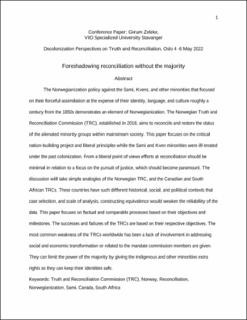Forshadowing reconciliation without the majority
Lecture
Submitted version
Permanent lenke
https://hdl.handle.net/11250/3055794Utgivelsesdato
2022Metadata
Vis full innførselSamlinger
Sammendrag
The Norwegianization policy against the Sami, Kvens, and other minorities that focused on their forceful assimilation at the expense of their identity, language, and culture roughly a century from the 1850s demonstrates an element of Norwegianization. The Norwegian Truth and Reconciliation Commission (TRC), established in 2018, aims to reconcile and restore the status of the alienated minority groups within mainstream society. This paper focuses on the critical nation-building project and liberal principles while the Sami and Kven minorities were ill-treated under the past colonization. From a liberal point of views efforts at reconciliation should be minimal in relation to a focus on the pursuit of justice, which should become paramount. The discussion will take simple analogies of the Norwegian TRC, and the Canadian and South African TRCs. These countries have such different historical, social, and political contexts that case selection, and scale of analysis, constructing equivalence would weaken the reliability of the data. This paper focuses on factual and comparable processes based on their objectives and milestones. The successes and failures of the TRCs are based on their respective objectives. The most common weakness of the TRCs worldwide has been a lack of involvement in addressing social and economic transformation or related to the mandate commission members are given. They can limit the power of the majority by giving the indigenous and other minorities extra rights so they can keep their identities safe.
Beskrivelse
Reconciliation without the majority: The Truth and Reconciliation Commisson of Norway, Oslo, 4. - 6. mai 2022
Arrangør: VID
